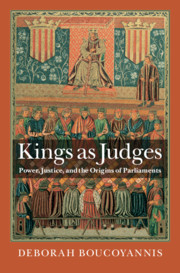Book contents
- Kings as Judges
- Kings as Judges
- Copyright page
- Contents
- Figures
- Tables
- Preface and Acknowledgments
- Part I The Origins of Representative Institutions: Power, Land, and Courts
- 1 Introduction: From Roving to Stationary Judges
- 2 A Theory of Institutional Emergence: Regularity, Functional Layering, and the Origins of Parliament
- 3 Explaining Functional Layering and Institutional Fusion: The Role of Power
- Part II The Origins of Representative Practice: Power, Obligation, and Taxation
- Part III Trade, Towns, and the Political Economy of Representation
- Part IV Land, Conditionality, and Property Rights
- Part V Why Representation in the West: Petitions, Collective Responsibility, and Supra-Local Organization
- Bibliography
- Index
2 - A Theory of Institutional Emergence: Regularity, Functional Layering, and the Origins of Parliament
from Part I - The Origins of Representative Institutions: Power, Land, and Courts
Published online by Cambridge University Press: 18 June 2021
- Kings as Judges
- Kings as Judges
- Copyright page
- Contents
- Figures
- Tables
- Preface and Acknowledgments
- Part I The Origins of Representative Institutions: Power, Land, and Courts
- 1 Introduction: From Roving to Stationary Judges
- 2 A Theory of Institutional Emergence: Regularity, Functional Layering, and the Origins of Parliament
- 3 Explaining Functional Layering and Institutional Fusion: The Role of Power
- Part II The Origins of Representative Practice: Power, Obligation, and Taxation
- Part III Trade, Towns, and the Political Economy of Representation
- Part IV Land, Conditionality, and Property Rights
- Part V Why Representation in the West: Petitions, Collective Responsibility, and Supra-Local Organization
- Bibliography
- Index
Summary
The first task in explaining parliamentary emergence is accounting for the regularity of the institution. The chapter advances a theory of functional fusion and institutional layering to explain why England developed a robust parliament, while France, which began with a very similar institution, did not. It begins by discussing some key necessary conditions, that of state power and related concepts, and by specifying the dependent variable, polity-wide representative institutions. The chapter then examines alternative explanations to show how they don't satisfactorily answer the three main questions regarding origins (regularity, the collective action problem, and territorial anchoring). The last part addresses the problem of regularity. It first presents data showing that taxation was too irregular to generate a robust institution and then presents the incentives that led especially more powerful groups, namely the nobility, to attend the institution regularly. Parliament dispensed legislation and justice and was the main forum for the submission of petitions, the universal medium of grievance that was at the core of parliamentary procedures.
Keywords
- Type
- Chapter
- Information
- Kings as JudgesPower, Justice, and the Origins of Parliaments, pp. 28 - 58Publisher: Cambridge University PressPrint publication year: 2021



